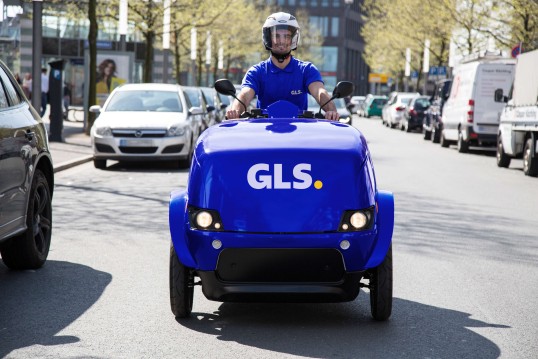Our responsibility
GLS takes its responsibilities towards employees, society and the environment extremely seriously and actively campaigns for fairness, education and a minimal impact on the environment.
In terms of environmental protection, the areas of focus are energy efficiency, the increased use of renewable energies and a reduction in pollution.
GLS systematically shortens its transport journeys on the basis of optimised route planning. More and more low-emission vehicles are in operation. GLS also factors ecological aspects into new builds, for example by using heat pumps and rainwater.
In particular, care is taken to ensure a spirit of partnership with all employees and transport partners. GLS regularly supports social organisations through donations and free transport services.
Our visions and values
Committed to a focus on quality.
-
Reliability
Delivering your parcel on time
Top shipping quality means that customers can rely on their service provider. Therefore, reliability is one of the key values for GLS – and employees work hard to uphold it every single day.
The entire GLS system is geared towards reliable shipping: site structure, network, information technology and the coordination/monitoring of processes.
The result: GLS delivers more than 90 per cent of all parcels within the defined standard delivery times across Europe. -
Security
Delivering your parcel safely and on time
Targeted security precautions are paramount in terms of getting goods safely to their recipients. GLS has implemented uniform safety standards across Europe and takes systematic preventive measures.
As a result, the damage and loss rate at the GLS Group has been consistently low at 0.01 per cent for several years.
State-of-the-art alarm systems keep shipping goods safe, whereas GLS monitors parcels via CCTV at hubs and larger depots. Each and every step of the process is supervised. GLS scans parcels at all key interfaces and analyses the data. -
Transparency
Keeping an eye on your parcel at all times
At GLS, the ongoing IT-assisted monitoring of each and every parcel is a cornerstone of high service quality. That’s why parcels are individually labelled and scanned at all key interfaces. This data is transparent across the Group, ensuring seamless parcel flows across borders.
For many senders, it is important that they can track their consignments. They often also want to share shipping status information with the recipients of their goods.
GLS makes the relevant status data available online, from collection to delivery. In many countries, this information can be retrieved pretty much in real time thanks to cutting-edge IT solutions and mobile data transmission from delivery vehicles. -
Flexibility
Finding the right solution for you
Modern parcel shipping is a highly industrialised and standardised process. This is the only way to achieve top quality at a reasonable price. Nevertheless, GLS attaches considerable importance to service flexibility, which it achieves through a clear portfolio structure.
The Group has established uniform basic products across Europe. On request, these can be combined with a variety of services, such as those specially designed for returns handling or e-commerce.
Many of the products and services are available all over Europe. They are then complemented by services tailored to the requirements of specific countries and that are only available in the countries concerned. -
Sustainability
Taking responsibility
GLS takes its responsibilities towards employees, society and the environment extremely seriously and actively campaigns for fairness, education and a minimal impact on the environment. In terms of environmental protection, the areas of focus are energy efficiency, the increased use of renewable energies and a reduction in pollution. GLS systematically shortens its transport journeys on the basis of optimised route planning. More and more low-emission vehicles are in operation. GLS also factors ecological aspects into new builds, such as by using heat pumps and rainwater. An environmental management system, certified in accordance with ISO 14001, is already in place at the majority of GLS companies. In particular, care is taken to ensure a spirit of partnership with all employees and transport contractors. GLS regularly supports social organisations through donations and free transport services.
Sustainable Development Goals
At its 2015 General Assembly, the United Nations set 17 Sustainable Development Goals (SDGs). These are designed to ensure sustainable development encompassing economic, social and environmental aspects.
169 individual targets form a framework to guide the actions of nation states, enterprises and individuals.
With its sustainability work, the GLS Group is also helping to make the SDGs reality.
Goal 7
Goal 7
In October 2019, GLS Germany switched completely to sustainable energy from renewable sources and no longer uses energy from fossil fuels.
Goal 8
Goal 8
GLS is committed to the training and professional development of its employees, but also to their health and social security as well as to respect for cultural diversity.
Goal 10
Goal 10
GLS supports selected projects and organisations by contributing a broad array of resources. We also provide free parcel delivery for charities and social organisations.
Goal 11
Goal 11
The combination of electric cargo trikes and micro depots has proved its mettle at GLS and will be rolled out further in a bid to achieve low-emission urban logistics.
Goal 12
Goal 12
The GLS Supplier Code of Conduct addresses key issues such as rules and regulations on environmental matters, bribery and corruption.
Goal 13
Goal 13
As part of the ThinkGreen initiative, the GLS Group has been supporting the responsible handling of resources and promoting the reduction of emissions since 2008.
Goal 16
Goal 16
GLS has a zero-tolerance policy on all forms of corruption and bribery. The principles of GLS are set out in the Code of Business Standards.

